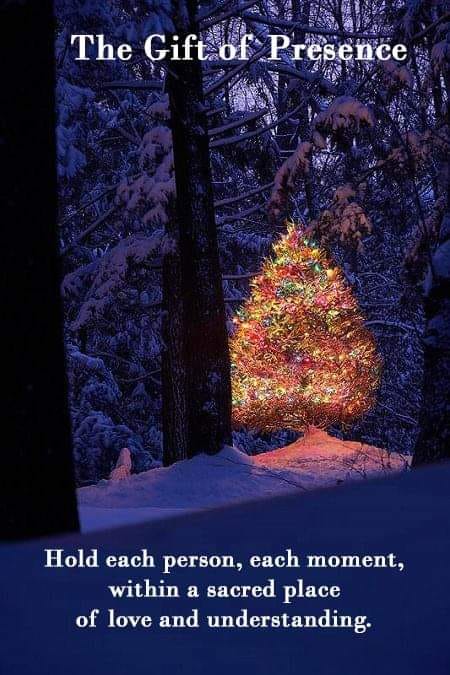Estimated reading time: 7 minutes
The Gift of Presence
Is my presence a present, a gift? Or do I stir up trouble wherever I go? What’s the overall effect of my presence?
It can be worthwhile to reflect on those people who have influenced us, both positively and negatively, as much as a consequence of who they were as much as by what they said or did. After all, it is who they were which was the foundation of their actions and words, as it is with all of us.
We can probably all think of people who, by their very presence, have a calming influence on tense or fractious situations. And, conversely, people whose very presence seems to trigger tension and controversy. Oscar Wilde quipped that: “Some people cause happiness wherever they go, others whenever they go.”
One way of thinking of presence is being “here and now” rather than “there and then” or “anywhere but here.”
To give the Gift of your Presence
The deeper the level of inner peace, of love and kindness, we embody, the more our presence is a true presence, a gift. It is the biggest gift we can give to another person. We all know the difference between talking to the side of someone’s head and having them give us their full, undivided attention.
It can be difficult to put into words. It’s something that’s more easily felt than it is described. You can feel its presence or absence in yourself. You can certainly feel its presence or absence in others. It’s a presence that emanates naturally from an inner state of being. It can’t be forced but it can be cultivated by mindfulness, by anything that deepens our own growing maturity and balance.
Ripple Effects of Presence
We’ve all heard some version of the story about “kicking the cat”. The boss shouts at a worker who then shouts at the janitor who goes home and shouts at their partner. The partner shouts at the child and the child kicks the cat. I’m sure we’ve all experienced this phenomenon. If we’re honest, sometimes we’ve been the one flying into a rage and setting the shouting ball rolling.
But what if the reverse is also true? You speak a kind word to a frazzled parent struggling with a wayward child. Instead of the criticism which the embarrassed parent expects, your kindness and compassion help the parent to relax. The child will probably calm down as well, once the parent relaxes, as a result of your calming presence. It doesn’t have to be dramatic. Rather than the situation escalating into a shouting match, or worse, an atmosphere of peace and acceptance allows both to come back into balance.
The Quality of Presence
Here are two examples of people who have a positive influence thanks to the quality of their gift of presence.
Miss Honey
In Roald Dahl’s novel “Matilda”, the teacher Miss Honey is the only grown-up character who actually behaves like a mature adult. She has a calm presence which automatically relaxes the small children in her charge. She doesn’t have to impose discipline or to raise her voice. The children feel safe with her, they sense that she respects them, and this brings out the best in them. Although she is very gentle, she is not a pushover. When necessary she can stand up to the bullying Miss Trunchbull.
Sarah
Sarah, a Buddhist friend of ours, is frequently brought into work situations that have become charged with power struggles. Her employer told me recently that the companies they work for often ask for Sarah to be on the team. Granted, her work is also excellent.
However, the main quality that she is valued for is how her presence seems to calm things down. This happens even if she doesn’t say a word about the issues that are triggering everyone else. She has dedicated much of her life to her spiritual growth and does her best to live by Buddhist principles. She has faced her own dark nights of the soul and has emerged stronger and more mature.
From her own life experience, she understands that, when people get stressed and contentious, respect and kindness can go a long way. Her compassion tells her that everyone is trying to do their best. When tensions rise, it’s often because people feel threatened or not good enough or just need some recognition or encouragement.
The Gift of Unassuming and Unselfconscious Presence
The Miss Honeys and Sarahs of this world demonstrate that the reverse of the “kick the cat” phenomenon is also true.
The children in Miss Honey’s class, for example, feel accepted and loved. They are more likely then to be kind to each other in the playground. Maybe one of them is kind to a child who is used to being bullied. The usually-bullied child might normally vent their frustration on a “weaker” child (from their perspective) or on a younger sibling or the family pet. But if the usually-bullied child is treated kindly and included in games in the playground, the outcome for the “weaker” child, the sibling or the family pet will be very different.
Cultivating Presence
Any valid personal or spiritual growth will contribute to the quality of our presence, including the practice of mindfulness and lovingkindness. As will expanding our capacity to love, including self-love and wholesome self-esteem.
Years ago I attended a talk about the positive effects on others of healthy self-esteem or self-love. More on that in another post. But, in terms of our presence being a gift, the speaker described how you would feel if you were the company of someone with healthy self-esteem. He meant a regard based, not on achievements or status but on valuing, i.e. esteeming, their intrinsic worth regardless of outer circumstances. A person with healthy self-esteem/self-love, would make other people feel good about themselves just by their very presence. They are more likely to be respectful, to listen, to see others are equals instead of competitors.
Mini-Meditations and Moments of Lovingkindness
It’s relatively easy to be present when we are alone, in a beautiful place or peaceful environment. It’s the everyday hubbub of life that can be more challenging. But that’s also where our spiritual muscles are getting their best workouts. And it’s often when our presence seems to go suddenly AWOL (absent without leave)!
For challenges “on the hoof” , where it isn’t possible to remove ourselves from the situation, here are some simple mini-meditations which can be practiced discreetly anywhere, with eyes open, in company, without drawing attention to ourselves. I have found them helpful more than once!
Some simple practices for Presence
Mini meditations that can take as little as a few seconds
- Exercise from Thich Nhat Hanh (a few rounds of this can be surprisingly effective)
Inhale thinking “In”, Exhale thinking “Out”
Inhale thinking “Deep.” Exhale thinking “Slow.”
Inhale thinking “Calm.” Exhale thinking “Ease.”
Inhale and hold, with a slight smile, thinking “Smile.”
Hold breath briefly, then on a good exhale think “Release.” - Breathing more slowly than usual
Simply become aware of breathing more slowing, especially helpful if you focus on breathing in and out of the abdomen. When we are tense or triggered, our breath becomes fast and shallower.
- Counting breaths
Simply count breaths i.e. on the inhale count up to whatever number you like, hold breath slightly, then exhale for same count or a bit longer, hold exhale briefly.
- Silently blessing or wishing people well
Bringing to mind that the people around you, even if they’re driving you nuts, are also faces of Source or God. Remind yourself of that with internal phrases or intentions like “may you be blessed, may you be at peace, Namaste (the divine in me acknowledges the divine in you.”
The Gift of our Presence, our Attention
The most precious gift we can offer anyone is our attention. When mindfulness embraces those we love, they will bloom like flowers. Thich Nhat Hanh
It’s a good exercise to reflect on the impact of our presence. It’s not about perfection. We all have our off-days, and sometimes people in a very agitated state may be further triggered by our very calmness. But are we generally moving in the direction of embodying a sense of peace, calm and kindness?
With thanks to Melissa Higginbotham for permission to use her artwork.
Post Categories
To find posts on a particular category, click on a link below:


